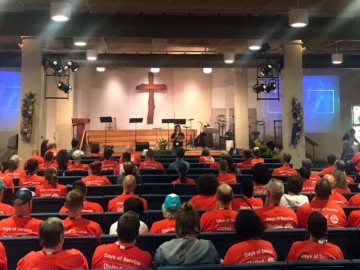
I clearly remember the year I got a Stretch Armstrong for Christmas. I remember taking that toy to our family dinner and asking everyone to stretch it with me. We would pull it far, stretched to just before a breaking point. Then, we would let it go and watch it slowly return to a standard form.
As a pastor, I have felt like that toy. I have been stretched with one arm in self-care and the other in self-denial. In pursuing self-denial, I have frequently attended evening church meetings when my family needed me at home. In hopes of self-care, I have selfishly put off hard yet meaningful conversations with people at church. I have hidden the church-stress headache from others: check the box for self-denial. I have over-protected my schedule, a win for self-care. I have people-pleased my way through agreeing to many things. (I call that walking the trail of self-denial to appease others! Or was that one self-care? It gets blurry.)
How long, O Lord, will it be until I finally strike a balance between self-denial and self-care in ways that honor you, Jesus?
Both are Necessary for a Christ-Centered Life
We are not destined to be super-stretched between self-denial and self-care. Though we may step clumsily between those at times, Jesus offers us a balanced way for the next steps in our walk with God.
Jesus said, Whoever wants to be my disciple must deny themselves and take up their cross and follow me (Matthew 16:24). God desires our self-denial. We must put personal preferences and pride aside when the cause is greater than us. The cause of your Kingdom come, your will be done, on earth as it is in Heaven is greater than us (Matthew 6:10). It is a freeing gift to take up the posture of self-denial for the causes of the Kingdom.
However, in the same Gospel, Jesus extended grace when he said, come to me, all you who are weary and burdened, and I will give you rest (Matthew 11:28). God desires that we pay attention to weariness and burden-filled seasons. Jesus cares about a Spirit-led stewardship of our self-care. The Bible says that prioritizing the health of our minds, bodies, and souls is to be seen as a spiritual aspiration (1 Corinthians 6:19-20).
Denying self is a historic Christian calling, yet overflow is subdued from an empty cup. A tip toward one side of the self-denial and self-care spectrum leads to an emptiness of genuine offering; the other side of that spectrum leads to self-obsession and indulgence.
So where can we find balance?
Scripture’s Guidance
God’s Word is sufficient to help us. In it, we find a way to faithfully carry the callings of self-denial, invitations to rest, and aspirations to care for ourselves. In the three Scriptures referenced above, the common link is surrender.
- Jesus helps us surrender to denying ourselves (Matt. 16:24)
- Jesus helps us surrender to rest (Matt. 11:28)
- Jesus helps us surrender to the spiritual aspiration of caring for ourselves (1 Cor. 6:19-20)
Let us look further in God’s Word to find greater understanding of this balance in the new (Mark 5:19) and in the old (Isaiah 43:18).
Surrender in the New
In Mark 5, Jesus heals a demon-possessed man in the region of Gerasenes. As Jesus gets into a boat to continue to other places, the healed man begs Jesus to let him go with him. Jesus responds, saying:
“Go home to your own people and tell them how much the Lord has done for you, and how he has had mercy on you.” (Mark 5:19)
We often believe that novelty is required in self-care, that only drastic changes can promote self-care. Like the man from Gerasenes, it’s easy to conclude Jesus’s plans for us will lead to new people and places.
Instead, Jesus calls the man to surrender to being new while attending to the same life. The man is then postured to be more open to exist in new ways in the same place. In surrender like this, the balance between self-denial and self-care is available.
Surrender in the Old
As we surrender our desire for novelty, we could accidentally forget that God indeed does new things. To assume God would never call us into a new thing would be an incomplete conclusion. A verse from Isaiah helps us keep a better balance:
Forget the former things; do not dwell on the past. (Isaiah 43:18)
Here, Isaiah was not telling the people to forget how God made a way for them before. He was asking them to stop clinging to that exact way of God’s leading. In essence, Isaiah was saying, “God is still the way maker, just not in the way you think it will happen. Do not cling to the past, demanding God act the exact way again.” Isaiah was helping God’s people open their hands to the new thing God was doing.
Releasing the past is difficult. Most of us would rather avoid change and the hard work that comes with it. New learning and new approaches are all hard to experience; it makes sense that we avoid challenging experiences. Yet, God may have a new way in mind. Your church building, programs, or models of the past may not be the new way the Spirit is shaping ministry at this time.
Christ offers the gift of rest as we loosen our grip on the past. This may involve grieving the past, releasing it, and welcoming something new. This takes self-denial. It is not easy to evaluate how tightly we are clinging to the former things. At the same time, this is self-care 101. Extending ourselves to hold up the past puts us on a doomed course. The stream in the wilderness (see Isaiah 43:19) brings new experiences of God’s goodness and faithfulness in our time. We can be thankful for former things, let go of them, and let them drift down the stream in the wilderness while God sends us something new.
Sabbath Surrender
So how do we practice this Spirit-led posture of surrender? In what ways can we strike a balance between self-care and self-denial, as seen in places like Mark 5:19 and Isaiah 43:18? I posit that we don’t need to look any further than the historic Christian practice of Sabbath. Sabbath is inherently all three:
- It takes self-denial to put your to-do list and agenda on hold.
- It takes self-care to pause long enough to find rest and refreshment.
- It takes surrender to give the day to God.
Sabbath is a gift to humanity. Jesus said, “The Sabbath was made for man, not man for the Sabbath,” (Mark 2:27). No longer stretched, let us sink into a practice of Sabbath, rest in God’s gifts, and surrender to being formed by God.


